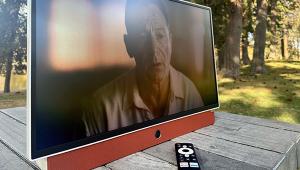If the price of entry to the world of honest hi-res audio via streaming is now only $299 for the Meridian Explorer2 DAC plus $20/mo for TIDAL, then sign me up! All I'm waiting for is an announcement that Warner and Sony are signing on. The rest will fall into place after that. Poor Neil Young.
Streamers Say Yes to MQA

The new technology is called MQA, or Master Quality Authenticated, a method of “audio origami” that folds down hi-res audio files (up to 192-kHz/24-bit) to roughly the same 1.5 Mbps data transmission rate as CD-quality audio—which is kind of like sucking Lake Erie through a straw. The result, says co-inventor Bob Stuart, is “a clear, accurate, and authentic path from the recording studio all the way to any listening environment—at home, in the car, or on the go.” In a New York demo, MQA sounded astonishingly transparent (though the use of a perfectly tweaked Meridian system surely helped).
MQA can be streamed or downloaded in existing lossless file formats, such as FLAC. And it is backwards-compatible with existing equipment, though an MQA hardware or software decoder is required to get the full benefit. Though Meridian’s Explorer USB DAC and Prime headphone amp are among the first MQA-compatible products, Meridian hopes to license the technology to other manufacturers.
The tricky part of this is not technology but provenance, an issue for hi-res audio software retailing in general. How do you know the master for that potentially costly MQA download or stream is the best possible digital or analog source, as opposed to a lower-resolution CD-quality or multi-generation analog copy? That’s the question Meridian, its partners, and other hi-res purveyors (such as Pono Music) have to answer. Someone has to do the research and authenticate the result, album by album. Otherwise, all the fancy audio encoding methods in the world won’t truly deliver a good recording at its best. And, of course, some recordings are just not worth the trouble: garbage in, garbage out.
But MQA is one of the most promising new audio technologies we’ve seen in a long time. Done right, it might accomplish the long-dreamt-of goal of getting listeners—even streaming listeners—past the velvet rope, into the studio, hearing what the artist intended.
- Log in or register to post comments


























































